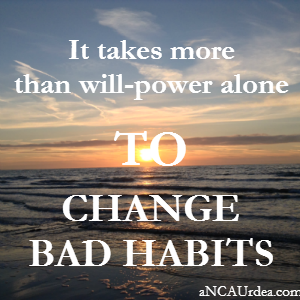If you have “bad” habits or habits that aren’t empowering you to achieve your goals, and you have tried to change them with will-power alone, I bet changes were hard to make and didn’t last long.
At a conscious level, we are aware we would achieve more if only we would do less of X behavious or more of Y behaviour. We can pinpoint what the unwanted behaviour is and the results we have when we do this behaviour. We can also pinpoint what we should do instead, what would be the desirable behaviour, in order for us to achieve the outcome we have in mind.
According to Maxwell Maltz, a plastic surgeon from the 1950s, it takes a minimum of 21 days for a person to form a new habit. Maltz concluded this after noticing that his patients took 21 or more days to become accustomed to their new look after suffering a plastic surgery.
This is where the popular “it takes 21 days to change a habit” myth comes from, and most people talking about it forget that it’s “21 days or more”, rather than 21 days sharp.
There’s a bit more to the bad habit than we give it credit for
The unwanted behaviour we are doing, or the bad habit we have, is a conscious process. However, the reason we are doing this behaviour lies at the level of the unconscious. This means that working with will-power alone, which again is a conscious process, although might get us the result we want, meaning changing our behaviour, is much harder work than changing the bad habit from its root, meaning changing it at the unconscious level. Also, by changing the bad behaviour alone, we eliminate an effect, rather than working with the cause.
Let’s take an example – biting your nails. If by will-power alone you manage to stop yourself from biting your nails, you succeeded in changing your bad habit, so well done to you! However, you haven’t identified and eliminated the cause for the nail biting you used to do, which, for instance, could be anxiety. Therefore, you will end up picking up another bad habit which would have at its cause your anxiety.
And here’s the good news:
By working with your unconscious to check what the cause of your bad habit is, you can not only eliminate the bad habit, but its cause too. What’s more, bad habits, limiting beliefs about ourselves and limiting decisions that we take throughout our lives, are most often examples of the same problem or cause. So by identifying and eliminating a problem at the unconscious level, we have multiple positive effects at a conscious level.
Let’s take an example – anxiety. If the cause of your nail biting is you being anxious, then by working to eliminate your anxiety would also cause you to stop biting your nails. If anxiety was at the cause of other problems you were experiencing, for instance limiting beliefs that you are not good enough or limiting decisions about things that you can or cannot do, then these would change too.
What if you secretly love your bad habit?
Let’s face it, some people just don’t want to get rid of their bad habit! They do admit it’s a bad habit, they say they want to stop it but they secretly love it because the bad habit brings them some great benefit, some form of second gain. And these people, no matter how much they say they want to give up their habit, and no matter how much some family and friends want them to give up their habit, they will not change.
If you have a bad habit you’d like to give up, or if you’d like to share your insights on your own bad behaviour(s), drop me an email at coaching@ancaurdea.com.


